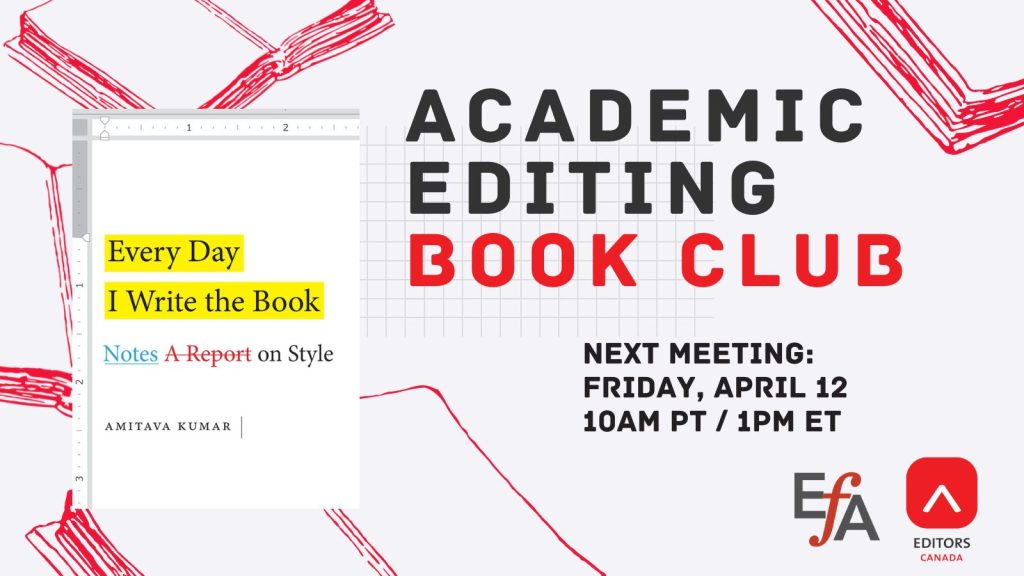Come Discuss “Every Day I Write the Book,” a Must-Read for Academic Editors

by Letitia Henville
On April 12, the Academic Editing Chapter of the Editorial Freelancers’ Association and Editors Canada will be hosting Amitava Kumar, the author of Every Day I Write the Book, for a 60-minute Q&A, as a part of our series of book club meetings. Dr. Kumar is the Helen D. Lockwood Professor of English at Vassar College in Poughkeepsie, New York. Please consider joining us for what should be a compelling conversation.
Amitava Kumar’s Every Day I Write the Book: Notes on Style (Duke UP, 2020) is unlike any other book about academic writing I’ve read. Dense with diverse references across its short essays—some only a paragraph; some largely quoted—Kumar implies that academics should reform their approach to scholarly writing. The advice is diffuse: “two credos: (1) there is no single way, and (2) write yourself into the tradition—fill a gap”; “fail, and fail better next time”; “everything need not be stated or explained in the very first paragraph.” It can also be evasive: “The writer, her estrangement from her surroundings, her bodily fear marking her presence on the page. There is a lesson here both for readers and writers,” Kumar tells us, without rendering explicit what that lesson might be.
Perhaps the best word to describe Kumar’s book is provocative—not in the sense of scandalous or titillating (despite its inclusion of a piece called “Erotic Style”), but in the sense of generating critical thought, bringing about new ideas, evoking new ways of thinking about what academic writing is or could be. I found the term provocative only once in Kumar’s book: “I dream of fresh, provocative, unpredictable texts”—books like the one he has here produced.
For example, consider the pair of essays “Terminology” and “Anti-Anti Jargon,” which follow one another in the middle of Part V, “Academic Interest.” While many of the editors I’ve met advise eliminating jargon, Kumar both sees the value of “specialized terminology” and celebrates the impact of “witness[ing] the tear in language—and in reality—when a set of specialized words are peeled away to reveal a more ordinary reality.” Then, summarizing the advice that writing experts Helen Sword, Eric Hayot, and William Germano give about jargon, Kumar invites the reader to move beyond the realm of conventional anti-jargon (and anti-anti-jargon) recommendations, instead positioning conventional academic forms—the monograph, the article—as modes of communication ripe for revolution. “We must,” he argues, model our academic writing on “better advocates of stylish writing”—models of writing that communicate their interpretations and ideas through story, through poetic-experimental prose, and through books that feature curated collections of visual art. Here, I see Kumar as showing us that, when we debate whether or not academics should use jargon, we’re missing the opportunity to engage in a profound reimagining of what academic writing can be and do. Focusing on mere jargon misses the point: now that’s a provocative claim to make to an editor of academic writing.
Few of the editors I’ve met imagine themselves as policing grammar or imposing strict rules onto texts. If you’re equally inclined to see your work as both art and craft, then Kumar’s work should have you questioning your assumptions about how data collection, analysis, and interpretation ought to be conveyed. Every Day provides us with a space to step out of our habitual modes of thinking.
While reading Kumar’s book, I spoke with a friend about her manuscript-in-progress, an art history monograph that will feature the voices and perspectives of contemporary Indigenous artists of the Pacific. “Will you bring your own body into the book?”, I asked my friend, and we then brainstormed options for integrating sensory details—touch, smell—into a work in a field that conventionally focuses solely on visual information. It’s a question I wouldn’t have asked without Every Day. If you’re an academic editor, you’ll likely be provoked to ask different questions from the ones that I posed to my friend—but I’m sure that you’ll likewise consider afresh your taken-for-granted editing approaches after spending a few hours with Kumar’s book.
To find our coupon code for 30% off the price of the book, and to RSVP for the Q&A with Amitava Kumar on April 12, 2024, please visit: https://us02web.zoom.us/meeting/register/tZMkfuGgqzgqHdHCHGfiPMBAv-cUeU_gbLML
Letitia Henville, PhD, is a book nerd, a bad swimmer, and the author of the monthly academic writing advice column “Ask Dr. Editor.” Her websites are shortishard.com and writingwellishard.com.

